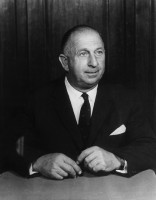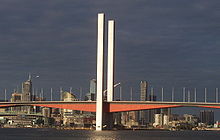Henry Bolte
Sir Henry Edward Bolte GCMG (born May 20, 1908 in Ballarat , Victoria , † January 5, 1990 ibid) was an Australian politician of the Liberal Party of Australia (LPA), who was the 38th Prime Minister of Victoria between 1955 and 1972 .
Life
Farmer and World War II
Bolte, son of the gold digger and innkeeper James Henry Bolte and his wife Anna Jane Warren, worked after attending the state school in Skipton and the Grammar School between 1924 and 1934 in the family's textile business in Skipton and as a stable boy before he started a sheep farm in 1934 Bamganie acquired from Meredith . There the farmer married Edith Elder on November 24, 1934.
During the Second World War , Bolte did military service between 1940 and 1944 in the 2nd Field Training Regiment of the Australian Military Forces and was last promoted to sergeant .
MP and Minister
After the end of the war, Bolte began his political engagement in the Liberal Party of Australia, of which he was founding president in Meredith. After an unsuccessful candidacy in the constituency of Hampden on November 10, 1945, he was elected for the first time in the following election on November 8, 1947 in this constituency as a member of the Legislative Assembly , the lower house of Parliament of Victoria . He was a member of the Legislative Assembly for almost 25 years until his resignation on August 24, 1972.
At the beginning of his membership in parliament in 1948 he was a brief member of the Committee on Public Works. On 7 December 1948 Bolte Prime Minister was Thomas Hollway first time in the government of the state called Victoria and held until the end of Hollways term on 27 June 1950, the Office of the Minister of Water Supply and mining (Minister of Water Supply and of Mines) . At the same time he acted between December 1949 and June 1951 as Minister of Nature Conservation (Minister of Conservation) .
Subsequently, he was from 1951 to 1953 Vice-Chairman of the Liberal Party and exercised after the election defeat of his party in the elections of December 6, 1952 from 1952 to 1953, the position of deputy opposition leader (Deputy Leader of the Opposition) , and was thus deputy by Thomas Hollway. In 1953 he was also a member of the Potato Marketing Committee.
Opposition leader and election victory in 1955
As Hollway's successor, he became chairman of the Liberal Party on June 3, 1953, and at the same time took on the role of opposition leader in the legislative assembly.
In these functions Bolte led the Liberal Party to victory in the elections of May 28, 1955. The party, which ran as the Liberal and Country Party , won 487,408 votes (37.78 percent) and received 22 seats more than the last Election, so that she narrowly missed an absolute majority in the 66-member legislative assembly with 33 seats. The Australian Labor Party (ALP) achieved 420,197 votes (32.57 percent), but lost 16.5 percentage points compared to the last election and due to the current electoral law, 17 of its 37 seats, so that it only had 20 MPs.
Prime Minister of Victoria 1955 to 1972
Election victories in 1958 and 1961
Bolte then succeeded Labor politician John Cain on June 7, 1955, the new Prime Minister of Victoria and held this office for more than 17 years until August 23, 1972. In his government he also held the office between June 1955 and August 1972 the Minister of Finance (Treasurer) and from June 1955 to July 1961 was again Minister for Nature Conservation. He was also briefly Minister of Lands and Soldier Settlement in June 1955 .
In the elections of May 31, 1958, Bolte was able to expand its supremacy with the Liberal Party: The Labor Party won the most votes with 515,638 votes (37.69 percent) and thus increased by 5.12 percent, but lost because of that Two more seats and only 18 MPs. Despite its 508,678 votes (37.18 percent), the Liberal and Country Party received six more seats and, with 39 seats, had its own absolute majority in the legislative assembly. Third strongest force was the Country Party , which received 127,228 votes (9.3 percent) and received nine seats.
The elections of July 15, 1961 did not bring about any major changes in the distribution of seats. The Labor Party under Clive Stoneham won with 552,015 votes (38.55 percent) and gained 0.86 percentage points, but lost another seat because of the right to vote and was only represented with 17 seats in the legislative assembly. The Liberal and Country Party Boltes Liberal and Country lost 0.74 percentage points with 521,777 votes (36.44 percent), but still had 39 MPs. The country party remained the third strongest, with 102,184 votes (7.14 percent) and nine MPs.
Election victories in 1964 and 1967
In the elections of June 27, 1964, the Liberal and Country Party under Bolte's leadership again emerged as the winner and received the most votes with 597,748 votes (39.63 percent), but lost one seat and despite an increase of 3.2 percentage points With 38 seats, it still had an absolute majority in the legislative assembly. Clive Stoneham's Labor Party, however, lost 2.33 percentage points and got 546,279 votes (36.22 percent), but won a mandate so that it was represented again with 18 seats. The Country Party improved slightly by 1.62 percentage points and won a seat with 132,067 votes (8.76 percent) and now has ten MPs.
After the elections, Bolte, who was again Minister for Mining and Water Supply between April 22 and 28, 1964, briefly took over the office of Minister of State Development in July 1964 . In 1965 he received an honorary doctorate in law (Hon. LL.D.) from the University of Melbourne and in 1966 he was made Knight Commander of the Order of St. Michael and St. George (KCMG), so that from then on he had the suffix "Sir".
The elections of April 29, 1967 brought more votes in favor of the Labor Party under Clive Stoneham, which received 596,520 votes (37.90 percent) and gained 1.68 percentage points, but lost two seats because of the right to vote and only 16 seats in the Legislative Assembly expanded to 73 mandates. Bolte's Liberal Party lost 2.14 percentage points, but won six seats with 589,985 votes (37.49 percent) and now had 44 MPs and thus still the absolute majority. The Country Party also won two seats with 136,126 votes (8.65 percent) and was now represented by twelve MPs.
Victory in 1970 and resignation as Prime Minister in 1972
Bolte, who also received an honorary doctorate in law from Monash University in 1967 , was also confirmed as Prime Minister in the May 30, 1970 elections. Under its new chairman, Clyde Holding, the Labor Party received the most votes with 693,105 votes (41.42 percent) and gained 3.52 percentage points and six seats, so that it now had 22 MPs. Because of the current electoral law, the Liberal Party still received 42 seats with 614,094 votes (36.70 percent) despite a slight loss of 0.79 percentage points and two seats. The third strongest force remained the Country Party, which received 107,011 votes (6.40 percent), lost four seats and now has eight seats.
After more than seventeen years as Prime Minister, Bolte, who was promoted to Knight Grand Cross of the Order of St. Michael and St. George (GCMG) in 1972, resigned on August 23, 1972. He was succeeded by the previous Vice Prime Minister Rupert Hamer , who was also chairman of the Liberal Party of Victoria.
After retiring from politics, Bolte took on numerous functions in business and was director of the Phosphate Co-operative Company of Australia , the Australian United Corporation Holdings Ltd and the Associated Securities Ltd from 1976 to 1979. He was also temporarily director of Transwest Haulage Holdings Ltd , the Guest, Keen & Nettlefold, Dennys Lascelles Ltd , of which he has been Chairman of the Board since 1980. He was also a director of John Swire & Sons Pty Ltd and, since 1979, a member of the supervisory board of General Motors Corporation.
Bolte, who also owned race horses and was a member of the Victoria Racing Club committee between 1972 and 1983 , was a lay preacher for the Church of England and suffered a serious car accident in 1984.
The Bolte Bridge , a large new bridge over the Yarra River, was named in his honor and, as part of the Western Link, belongs to the CityLink , a system of toll city highways in Melbourne .
Web links
- Entry on the homepage of the Parliament of Victoria (accessed June 1, 2015)
| personal data | |
|---|---|
| SURNAME | Bolte, Henry |
| ALTERNATIVE NAMES | Bolte, Sir Henry Edward (full name) |
| BRIEF DESCRIPTION | Australian politician |
| DATE OF BIRTH | May 20, 1908 |
| PLACE OF BIRTH | Ballarat , Victoria |
| DATE OF DEATH | 5th January 1990 |
| Place of death | Ballarat , Victoria |

